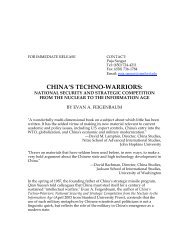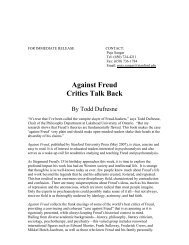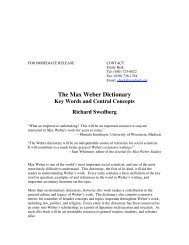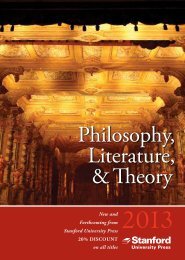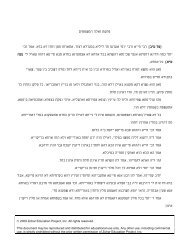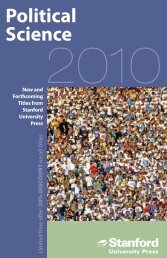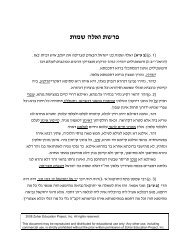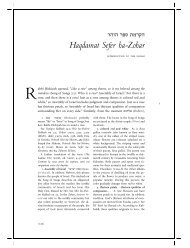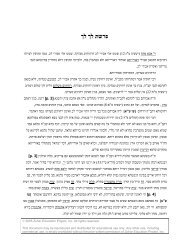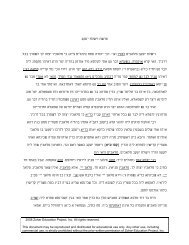Press Release (PDF) - Stanford University Press
Press Release (PDF) - Stanford University Press
Press Release (PDF) - Stanford University Press
You also want an ePaper? Increase the reach of your titles
YUMPU automatically turns print PDFs into web optimized ePapers that Google loves.
FOR IMMEDIATE RELEASE<br />
CONTACT:<br />
Puja Sangar<br />
Tel: (650) 724-4211<br />
Fax: (650) 736-1784<br />
psangar@stanford.edu<br />
SOMETHING TO BELIEVE IN: POLITICS,<br />
PROFESSIONALISM, AND CAUSE<br />
LAWYERING<br />
By Stuart Scheingold and Austin Sarat<br />
“This highly engaging book is both a discriminating study and a rousing defense of what<br />
it unapologetically refers to as ‘cause lawyering.’ Professors Scheingold and Sarat offer<br />
fresh views on how lawyers so often end up isolated from their personal values. They are<br />
especially penetrating in their analysis of the intricate connections between lawyers’ roles<br />
and the ideals of a liberal democracy.”<br />
—Scott Turow, author of Reversible Errors and Ultimate Punishment<br />
“This is a concise, beautifully written, and ground-breaking book that sets forth a new<br />
theoretical roadmap for a diffuse but increasingly important field.”<br />
—Lucie White, Harvard Law School<br />
“This superb new book . . . is a rich synthesis of several decades of research on cause<br />
lawyers and cause lawyering. . . . [It] is a must-read for all scholars and students<br />
interested in cause lawyers and the intersection between law and politics in the U.S.”—<br />
The Law and Politics Book Review<br />
Lawyers in the United States are frequently described as “hired guns,” willing to fight for<br />
any client and advance any interest. Claiming that their own beliefs are irrelevant to their<br />
work, they view lawyering as a technical activity, not a moral or political one.<br />
But there are others, those the authors call cause lawyers, who refuse to put aside their<br />
own convictions while they do their legal work. This “deviant” strain of lawyering is as<br />
significant as it is controversial, both in the legal profession and in the world of politics.<br />
It challenges mainstream ideas of what lawyers should do and of how they should<br />
behave.
Something to Believe In (published in September 2004 by <strong>Stanford</strong> <strong>University</strong> <strong>Press</strong>)<br />
explores the work that cause lawyers do and the role of moral and political commitment<br />
in their practice. It also describes the role of legal education and the organized legal<br />
profession in providing opportunities and imposing constraints on moral and political<br />
advocacy.<br />
In the United States, the relationship between the organized legal profession and cause<br />
lawyering has been ambiguous. After decades of being on the fringes, cause lawyering<br />
has taken a hold since the 1960s. This is due to the work of civil rights and antipoverty<br />
lawyering, and the work of organizations like the NAACP Legal Defense Fund, the<br />
Environmental Defense Fund, and the Center for Constitutional Rights. The profession<br />
has evolved to accommodate lawyers who construct their practices by targeting clients<br />
whose cases further the causes they believe in.<br />
Today, cause lawyers go by many names, serving many causes—human rights lawyers,<br />
feminist lawyers, civil rights and civil liberties lawyers, environmental lawyers, property<br />
rights lawyers, anti-poverty lawyers. They take different positions and advocate for a<br />
variety of political issues, such as abortion, gun control, prayer in public school, and the<br />
death penalty.<br />
The book examines “the embeddedness of cause lawerying in various institutional<br />
frameworks composed of the organized bar, law schools, practice settings, and the legal<br />
and political agencies of American democracy.” According to the authors, “the place of<br />
cause lawyering depends on its possible contributions to liberal democracy and the<br />
strategic choices cause lawyers make.” It is as advocates for liberal-legal rights, that<br />
cause lawyers occupy a shared terrain with other lawyers in the domestic sphere and,<br />
increasingly, on the global sphere as well.<br />
Biographies<br />
Stuart Scheingold, professor of political science emeritus at the <strong>University</strong> of<br />
Washington, has done considerable work on the European Community. In recent years<br />
he has focused exclusively on public law, specifically on the politics of crime and<br />
criminal justice and on law, lawyers, and social justice. His most recent publications<br />
include Cause Lawyering: Political Commitments and Professional Responsibilities<br />
(Oxford, with Austin Sarat) and Politics, Crime Control and Culture (Ashgate).<br />
Austin Sarat is the William Nelson Cromwell Professor of Jurisprudence and Political<br />
Science, Amherst College. His publications include: Dissent in Dangerous Times, The<br />
Place of Law, Law's Madness, and Cultural Studies and Law: Beyond Legal Realism in<br />
Interdisciplinary Legal Scholarship. He has four books forthcoming with the <strong>Stanford</strong><br />
<strong>University</strong> <strong>Press</strong>: The World Cause Lawyers Make (with Stuart Scheingold), Law on the<br />
Screen, The Cultural Lives of Capital Punishment, and The Limits of Law.



